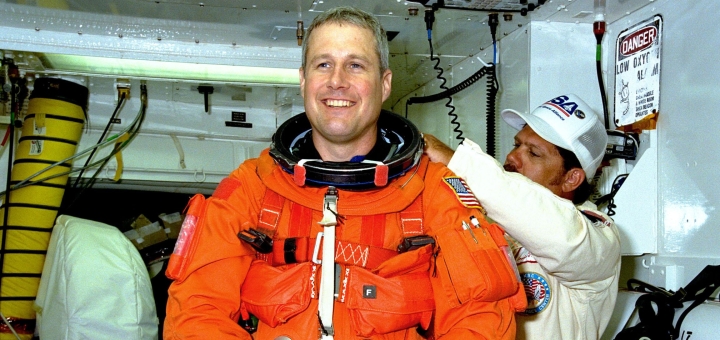On April 17, 1998, Jay Buckey rode the space shuttle Columbia into low Earth orbit. Over the next 16 days, he studied the impact of microgravity on the human nervous system. Along with six crewmates, and confined to the shuttle’s limited livable space, Buckey circled the planet 256 times. Taking a walk in the backyard was not an option.
The shuttle crew worked well together for the relatively short mission, but it could have been different, says Buckey, a professor of medicine at the Geisel School of Medicine. If the flight had stretched on for much longer, the effect of confinement could have crept in.
“People who are isolated and confined are at risk for conflict, stress, and depression,” says Buckey. Fortunately, there are skills people can use to deal with this, and these skills can be learned.“
As director of the Space Medicine Innovations Lab at Geisel, Buckey studies strategies to help enable people work effectively in small spaces for extended periods. A self-help research program developed along with his colleagues is available online to anyone interested in learning more about the approaches that are used to deal with the psychological challenges of confinement.
While the program is not designed specifically for the social distancing and quarantine measures associated with COVID-19, Buckey believes that it has relevance in the context of the pandemic.
”These resources are meant to make anyone better at stress management, depression treatment, and conflict resolution,“ he says. ”The individual is doing the work. The tools offer practical things that people can do in any environment.“
The videos and information sheets in the research program were created for individuals who cannot get access to the outside world, such as those working in places like outer space and research stations in Antarctica. ”There is no reason why people who suddenly find themselves stuck at home for long periods of time—alone or with others—shouldn’t also access these resources,“ Buckey says.
The web-based tools work on any laptop or desktop computer, but devices such as phones and tablets are not currently supported. Since the programs are offered as part of a research project, a consent form is included with registration. Users do not have to be affiliated with Dartmouth, so the resource links can be shared with family and friends wherever they are.
Accessing the research site might be easy, but Buckey notes that learning any new skill takes patience. ”Our experience has shown that it’s best for people to take their time when trying to change how they think about a situation or when developing a new behavioral skill.“
In talking about his research on confinement, Buckey refers to a passage from Valentine Lebedev’s Diary of a Cosmonaut, a firsthand account of over 200 days spent aboard Russia’s Salyut-7 space station: ”We don’t understand what’s going on with us,“ Lebedev wrote. ”We silently walk by each other, feeling offended. We have to find some way to make things better.“
After years of research, Buckey and his colleagues have a good understanding of the psychological impact of confinement. ”For people who are depressed, stressed, or experiencing conflict in confinement, there is often no one to turn to for support,“ he says. ”Dartmouth has excellent wellness resources. We hope that our tools can also help the community get through a tough stretch.“
The self-help program includes strategies for dealing with stress, depression, and conflict, among them:
- For stress: Strategies for assessing a stressful situation correctly, to avoid over-reacting, ”catastrophizing,“ or making judgements that don’t fit the evidence. Also includes relaxation techniques, tools to help put aside troubling thoughts, and advice on effective communication.
- For depression: A structured, practical problem-solving approach, which previous studies have shown can improve mood.
- For conflict: Examples and exercises that explain how each individual’s differing interpretations of statements, and the meanings assigned to those statements, can escalate conflict. Also, interest-based negotiation tools designed to help people get to good solutions while maintaining relationships.
- For isolation from nature: Buckey’s lab has developed virtual reality tools that create an immersive natural environment. Since acquiring VR headsets is not possible for most people, Buckey says that viewing photos or videos of nature from a television, computer, photo album, or picture book may give close to the same effect.
For the latest information on Dartmouth’s response to the pandemic visit the COVID-19 website.
David Hirsch can be reached at david.s.hirsch@dartmouth.edu.

